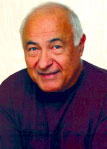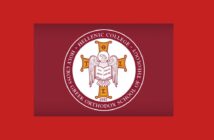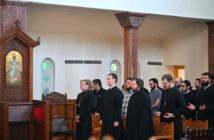By Steven P. Stamatis, M.A.
The mid-December edition of the National Herald featured an analysis by Theodore Kalmoukos regarding the “Drama at the School of Theology.” The author is correct. The continuous theater at Holy Cross School of Theology has reached the level of a Greek tragedy. Sophocles would be proud to witness the maneuverings of hierarchy and administrators and observe the resetting, decline and disarray of the only Greek Orthodox institute of higher learning in America.
Kalmoukos calls to our attention the dismissal of key professors who have added prestige to the school throughout the early years. He refers to continuous restructuring as Experiments— perhaps to discover what works.
Although some changes and dismissals occurred many years ago,
I don’t believe they were “Experiments” as the author suggests.
As new Archbishop of America, Iakovos arrived in 1959 with an added mandate to promote Greek letters and culture in America through the Church. I was there as a student that year and witnessed the planned transformation of the school, an action which erupted in a student-wide protest. He came to the seminary at the beginning of the term to address the students and faculty on the importance of promoting the rich legacy of the Greek Orthodox tradition.
At the time, many of us didn’t understand what that meant, but the signs were unmistakable. In classrooms, many icons on the walls were replaced with portraits of the Parthenon, Acropolis, Erechtheion and other ancient ruins. Additionally, more Greek was added to the curriculum, (modern and ancient) including grammar and history.
It felt as though I returned for my second year to a college in Greece. Even some required electives were deleted which risked compliance with local accrediting bodies. This dramatic change didn’t bother me at first, as I was fluent in both languages; but it had great impact on students of the college division. They were there to become “Fishers of Men,” not Greek ambassadors.
I realized later that a new die had been cast for the Ideal Greek Orthodox priest. To my knowledge, that program has not changed in 65 years.
Nonetheless, Kalmoukos calls for a national campaign
in Greek communities to find new, capable and
balanced students to study and become ordained.
I don’t know what he means by “Balanced,” but that campaign actually reared its head in the Fall semester of 1959. Admission criteria favored applicants who were versed in the Greek language and culture. At the time there was a fertile crop of young men from earlier immigration of the post-war years who fit that profile. But even then, many of them from Greek families who felt a calling to the priesthood were American born in English-speaking households; and most were not articulate in Greek.
Regrettably, the latter group did not qualify to meet the standards of the new vision of a Greek Orthodox priest. So, many were not admitted. Those about to return who had a Greek language deficit and those who did not pass the appearance test, were actually advised by letter not to return. Applicants who were accepted but who were still weak in Greek, had to undergo a preparatory year prior to the Freshman class for extra Greek instruction. Even upper-classmen who still struggled with Greek, had to add an extra year of study in Greece prior to graduation.
This new agenda turned away those individuals with a serious calling for the priesthood, but who fell short of the new standard. It also paved a collision course with the world-renowned professor at Holy Cross, Georges Florovsky and other capable professors. As an ecumenical Theologian, Florovsky envisioned common spiritual ground with the Western Churches, even the heterodox splinter groups and encouraged pursuit of a clear path toward ecclesial reconciliation. In short, he was committed to bringing together much of the Christian world.
Clearly, Florovsky’s position was not in harmony with Iakovos’ new mandate. So, he had to go. Besides, he was too ecumenical for the new agenda—and he wasn’t Greek.
This action stunned faculty and students. Some students had enrolled
because Florovsky had joined the faculty. It was like firing Sigmund
Freud, (professor of Neuropathology) at the University of Vienna.
The dismissal of Florovsky reverberated across the corridors of Holy Cross. Soon after, Professor Romanides, another valuable academic asset, resigned in protest at Florosvky’s dismissal. Obviously, this program did not work then, does not work today and lessons were not learned.
But there is more! Kalmoukos goes on to discuss the recent resignations of the president, George Cantonis and the dean, George Parsenios, followed by an academic search for their replacement. So, the drama continues and those in authority insist on doing the same things and expecting a different outcome.
Clearly, that archetype of a modern Orthodox priest must change
in the mind and heart of the Church, to finally reflect the evolving
cultural ethos in America that’s impossible to deny or ignore.
Today, most descendants of Greek immigrants do not speak Greek. However, they do feel a tepid sense of pride about their ancestry and enjoy a fondness for Greece, the home of their forefathers. They even love shouting “Oppa!” when the waiter ignites the saganaki in Greek restaurants. They also participate in line dancing at the few traditional Greek weddings that occur. But that’s about as Greek as most of them get.
More important, they are baptized Orthodox Christians who grew up attending church as children; and now are struggling to embrace a Faith they can’t understand. Clearly, they do not respond to political and ethnic aspects of Greece.
For the most part, they don’t care much about the plight of Cyprus or Greek politics; or who the prime minister of Greece is; or the enmity between Greece and Turkey; or the mysterious goings-on at the Mother Church in Turkey, (a 99% Sunni Muslim country). Nor do they bother to speculate on why the Patriarchate of the Church is still anchored in alien territory.
In short, they are Americans of Greek descent, and continuous attempts to grow the Greek language and culture in this country through the Church will alienate more of them. This practice has been and will be a futile exercise, a waste of money, time and temper. It is sure to resurrect painful memories of Greek school (which hasn’t worked that well either) for those old enough to remember. The question many of us are afraid to ask: If the ship of Hellenism eventually goes down in the U.S. because of attrition, will we allow the Faith to go down with it?
If the Greek population in America had been as robust in numbers like the Hispanics, with continuous immigration and a strong ethnic infrastructure, there might have been an opportunity to overcome total assimilation and establish a functioning Greek culture. But such is not the case anymore. “Greektown” sections in major cities like Chicago, New York and Detroit have already seen their best days in the 1960s and 70s.
Kalmoukos closes with his ideal replacements for president and dean:
The person who will be selected should be most suitable with training,
character and knowledge of the Greek language and a love for Hellenism
…and also familiar with the Greek-American community and its realities.
An Orthodox Christian who is steeped in the Greek language and Hellenism and loves the Church, cannot be the same person who truly understands today’s Greek-American community and its realities. These are two opposing perceptions. Maybe we shouldn’t look at the community the way some of us want it to be, but accept the evolving “realities” which may never look back.
So, let’s take a closer look at the Greek-American community and its realities. Maybe the Greek-American community today is more American than Greek. Maybe the descendants of the immigrants of 50-75 years ago are no longer in step with the ethnic/racial flavor of the Orthodox Church. What are we to do? How many more years will be wasted in denial? And how many more generations of disenfranchised faithful will we watch walk away?
Many of us pray that those in authority step back, pause and review these issues. And we hope they ask the right question: NOT how to retain and grow the Greek language and culture in America, but rather how to retain and grow the Orthodox Faith in an English-speaking country. Maybe that’s what’s wrong at the school! Priests are still trained to serve a Greek “Homogeneia” that is quickly vanishing.
Perhaps they may realize that the time has come to finally draw a distinction between modern Greek language & culture and the Orthodox Faith; and finally realize that the historic connection to Hellenism has faded and redefined through the years. It’s time for the squeaky-wheeled minority demands to yield to the tens of thousands of unchurched Orthodox Christians of Greek descent who long to come home to a church that has abandoned them.
Perhaps the time is overdue for the Archdiocese to consider a language overhaul, a transition to the language of the people; to welcome back several generations of Orthodox Christians who have been ignored because they were not “Greek” enough. That’s the same policy that shut the door to many young men inspired toward the Orthodox priesthood back in 1959. Apparently, it hasn’t changed.
It has always been clear to me that the Orthodox Faith is the most sacred Spiritual Essence to embrace and cultivate, while the Greek language has been the medium of delivery for centuries. Before the advent of Christianity, the phenomenon of Hellenism set the stage for the Christian Church, and soon after, got surgically sewn onto the fabric of the Faith. But through the years and into the 21st Century, the philosophic connection has morphed into a version of “Modern Greek language and culture,” which bears little resemblance to the Hellenistic model.
The Orthodox Faith is all we have as the ultimate hedge against
the prospect of personal extinction, whereas the Greek language is
merely a communication vehicle; and the Greek culture here faces
overwhelming headwinds. To view the latter on the same level or
as more important than the Faith, is a disservice to both.





2 Comments
Pingback: The Continuous Drama of the School of Theology - Orthodox Christian Laity
Well written, prescient and right on target. Ultimately, the main criterion for clergy should be love and commitment to Jesus Christ.